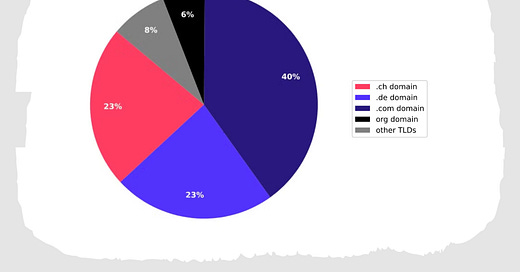SEO domain strategy: Do country-specific domains lead to higher rankings?
The question, whether country-specific domains (ccTLDs) like .ch have a clear ranking advantage over generic domains (gTLDs) like .com frequently sparks debate in the SEO community. Recently, Google analyst Gary Illyes made a clear statement on this topic in an episode of the podcast "Google SEO office hours":
A user asked:
"If someone in Korea searches in Korean, does a .kr domain rank better than a .com domain?"
Gary Illyes replied:
"In general, local domain names, in this case, .kr, perform better because Google prefers content that is locally relevant to the user."
Is Gary right?
We wanted to find out for sure.
Follow us, as we deep dive into our data study to find out if country-specific domains like .ch actually have an advantage in local markets.
TL;DR
Non-local domains dominate local search results: Covering 40% of the top 10 results, .com domains are the most represented domain type. This shows that global TLDs can perform well in Switzerland and other local markets.
Non-local domains dominate informational search queries: For knowledge-based keywords, non-local domains show up more often than local domains.
Local domains dominate transactional search queries: For purchase-intent keywords, .ch domains secure 55% of the top 10 positions.
Local domains perform well despite lower domain ratings: Local domains require on average 25% lower domain ratings than TLDs to rank well for the same keywords.
The methodology
We analyzed 3’200 German search results in Switzerland and focused on keywords in the IT and software industry, as we work with many clients in this space. The keywords we have chosen represent different stages of the search journey to cover both informational and transactional search queries. This should help us reduce distortions from too broad a keyword set, ensuring that the analysis provides realistic insights. For the full break down of our methodology and analysis, please visit digitalleverage.ch (in German).
Our findings
1. International domains dominate Switzerland's top 10 search results
In Switzerland's top 10 search results, .com domains are dominating with a 40% share. .ch and .de domains are equally represented, each making up 23% of the results. This means .ch domains account for just under a quarter of the results.
2. Local domains excel even with lower domain ratings
Interestingly, despite their lower presence in the top 10 search results, .ch domains on average have a domain rating that is 16 points or 25% lower than .com domains. This may indicate that Google places more weight on geographic relevance for Swiss content than on domain rating.
.com domains, on the other hand, tend to rank well in Switzerland only if they have high domain ratings.
However, for almost 80% of all analyzed keywords, international domains dominate.
This suggests that for queries without a clear local relevance, a strong domain rating and high-quality content are more important than locality!
However, a closer look at the results shows that the composition of the SERP varies significantly depending on the topic area.
3. For transactional keywords, local relevance matters
For transactional keywords with a clear purchase intent, such as "web design agency zurich" or "crm consulting," .ch domains dominate and occupy 55% of the top 10 results. One possible reason for this is that Google favors local providers for these types of search queries.
This trend aligns with Google’s increasing focus on local search results, which has become more apparent in recent years through the stronger integration of Local Packs and regional search results.
4. For informational keywords, content is king and beats local relevance
For informational keywords, international domains dominate the top 10 search results, while .ch domains are less frequent and appear lower in the rankings. This is especially true for keywords in the How-to, Wiki, and Listicle categories.
This suggests that for informative content, the quality of the content outweighs geographic relevance.
It’s also interesting to note that .de domains often rank well for informational keywords, even when they have relatively low domain ratings. This further confirms that Google prioritizes content quality and meeting user intent over geographic relevance.
Disclaimer: The underrepresentation of .ch domains in the top 10 results could also be due to the fact that there are simply fewer Swiss pages available. This could skew the results in favor of international domains. However, we did not investigate this assumption further in our study.
How I’d use this to my advantage
If you are a local service provider looking to maximize organic visibility, traffic and conversions, we recommend the following actions:
1) Use ccTLDs for local markets: A local domain strengthens your local presence and increases your chances of good rankings in your local market, even with a lower domain rating. Leverage this advantage to secure your local relevance and top rankings.
2) Optimize for transactional keywords: Make sure to cover transactional keywords such as "it service provider" as you’ll have a clear advantage over international competitors, allowing you to capture valuable clicks and conversions.
3) Fill gaps in search results with quality content: If many international domains rank for informational keywords, it may indicate that there is currently a lack of high-quality content from local domains. This presents a valuable opportunity to create your own high-quality content and dominate the rankings in your country.
4) Use .com domains for international markets: Opt for generic TLDs like .com if you already have or plan to gain international reach. These offer global flexibility and are well-established in various markets. Although small disadvantages may occur with transactional keywords, the consolidated domain rating provides additional benefits for strong rankings.








